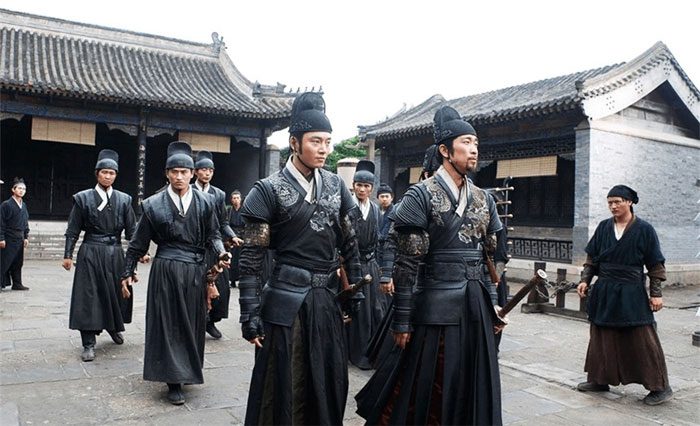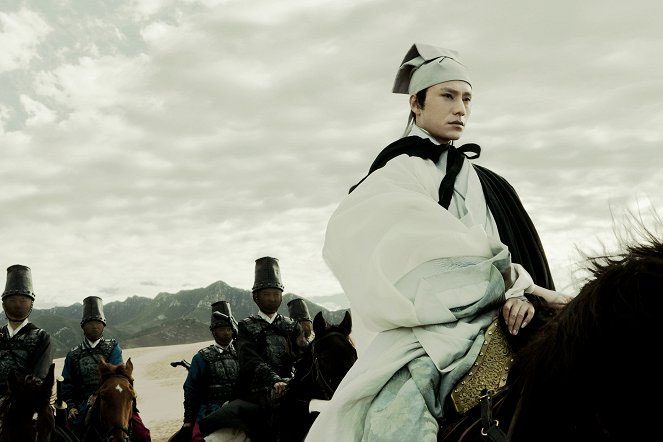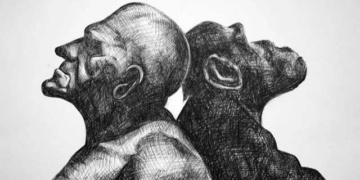The Cẩm Y Vệ was already a notorious organization, yet it still feared this evil organization.
Cẩm Y Vệ, Eastern Bureau, and Western Bureau
In 1379, a major crime occurred during the Ming Dynasty when the current Chancellor, Hồ Duy Dung, was accused of plotting a rebellion. In a fit of rage, Zhu Yuanzhang ordered the extermination of Hồ Duy Dung’s entire clan, subsequently executing over 30,000 associates connected to him.
The harsh experiences during his youth led Zhu Yuanzhang to lose faith in the civil officials. Following the Hồ Duy Dung incident, he resolved to abolish the chancellor system.
However, the death of Hồ Duy Dung did not alleviate Zhu Yuanzhang’s concerns, as he feared that without a thorough solution, the empire he had fought so hard to establish would be overthrown like the previous dynasty – the Yuan.
After the Hồ family incident, Zhu Yuanzhang selected the children of impoverished families to build the Cẩm Y Vệ, serving as an “honor guard” to protect the emperor while also apprehending thieves and robbers.
Of course, their primary mission was to carry out Zhu Yuanzhang’s orders: to investigate and capture officials. Any action taken by the Ming officials, even the discussions held in their homes or what they ate, fell under the reporting scope of the Cẩm Y Vệ.
Due to the authority of the Cẩm Y Vệ surpassing that of the Great Ming law, and their ability to independently conduct interrogations and arrests, they quickly became a sharp and fearsome sword hanging over the heads of Ming officials.

Images of Cẩm Y Vệ in Chinese films. (Illustrative photo. C.N).
Subsequently, members of this organization would be promoted to local officials in distant regions. At that time, people whispered that if they saw anyone dressed lavishly, riding a large horse, and speaking the capital’s dialect, they should not hesitate to approach and ingratiate themselves.
However, the glorious period of the Cẩm Y Vệ did not last long; Zhu Yuanzhang ordered the disbandment of this unit just five years after its establishment.
However, after Zhu Yuanzhang’s death, Zhu Di usurped the throne from Zhu Youwen and restored this organization to suppress the former officials who did not support him.
To balance power, Zhu Di also established a new agency called the Eastern Bureau. At this time, Cẩm Y Vệ no longer held a monopoly on power; instead, it frequently fell under the scrutiny of “predators” like the Eastern Bureau. After all, the head of the Eastern Bureau was a eunuch, closely positioned next to the emperor, making it easier to persuade the emperor.
Later, during the reign of Ming Xianzong, he continued to establish another agency named the Western Bureau. From that point on, Cẩm Y Vệ, Eastern Bureau, and Western Bureau formed a powerful trio, collectively known as the Bureau of Guards, becoming an absolute power capable of arresting, judging, and executing.
The legendary Pandora’s box in Western mythology, once opened, is difficult to close. The Bureau of Guards is similar. The most mysterious and terrifying aspects of the Ming Dynasty emerged from the very pillars of the Bureau of Guards.

Character design of Wu Huadian from the Western Bureau as portrayed by actor Chen Kun. (Photo: C.N).
The Bureau of Guards is considered mysterious because even the members of Cẩm Y Vệ dared not approach it casually, let alone the historians. They could only see the outside but not know the inside, thus unable to record details about this organization for future generations.
The Bureau of Guards has been assessed as nefarious since its establishment, having become a repository of barbaric and terrifying plots.
Organizations More Evil than Cẩm Y Vệ, Eastern Bureau, and Western Bureau
However, none of the three organizations mentioned above are as frightening as the one regarded as the most evil in Ming history – the Internal Affairs Bureau.
In 1508, under the instigation of Grand Eunuch Liu Jin, Emperor Zhengde established the Internal Affairs Bureau, headed by Liu Jin.
The Internal Affairs Bureau, also known as the Bureau of Internal Affairs, does not seem much different from the Eastern and Western Bureaus.
However, its terrifying aspect is that, in addition to supervising officials and the populace, it even had the authority to arrest and interrogate members of the Bureau of Guards.
In other words, whether one is from Cẩm Y Vệ, Eastern Bureau, or Western Bureau, upon encountering the Internal Affairs Bureau, they must tremble and flee, for once caught by this organization, skinning alive is merely the opening act.
Moreover, the jurisdiction of the Internal Affairs Bureau was extensive; even a normal widow remarrying fell under their control.
Since the establishment of the Internal Affairs Bureau, Liu Jin began to dominate the court. This organization set a precedent that had never been seen before. It implemented punishments reminiscent of “the law of the jungle”: “Regardless of the severity of the crime, all were punished with beating by staff, sent to guard the frontier indefinitely, or forced to wear shackles in exile.”
Not stopping there, Liu Jin also exploited the Internal Affairs Bureau to attack opponents, harming upright officials and the common people. Historical records indicate that, within a short period, thousands of officials and soldiers died at the hands of this organization unlawfully.
Liu Jin’s goal in instigating the emperor to establish the Internal Affairs Bureau was to silence the supervising officials (from six departments: history, finance, rites, military, justice, and works) and to make the civil officials bow and pay respects to his organization.
Indeed, after the establishment of the Internal Affairs Bureau, Liu Jin held tremendous power. At that time, all appointed officials had to bow and pay homage to him at the Internal Affairs Bureau, and officials from the capital on missions had to offer money, while local officials entering the capital had to pay bribes of tens of thousands of taels of gold.
Local officials entering the capital had to borrow money from landlords first; this loan was called “Capital Debt”, used to curry favor with the head of the Internal Affairs Bureau.
Using this tactic, within a mere 3-5 years, Liu Jin amassed profits amounting to 60 million taels of silver.
But ultimately, Liu Jin’s beautiful dream did not last long. In 1510, Emperor Ming Wuzong recognized his vile nature and officially ordered Liu Jin to be punished with death by slow slicing.
This is indeed the price he must pay for the crimes he committed against innocent people at that time.





















































